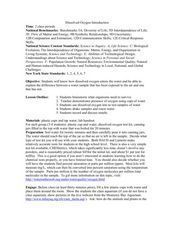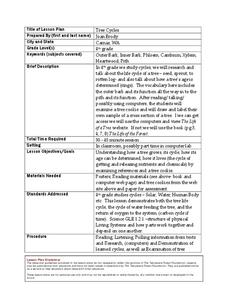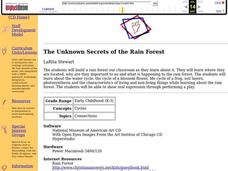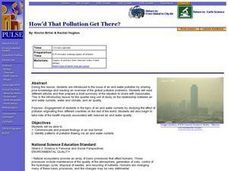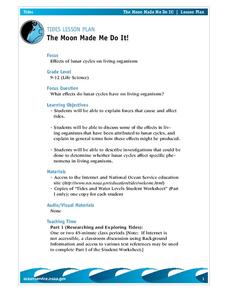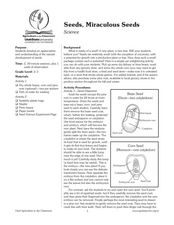Curated OER
Dissolved Oxygen Introduction
Students are shown how dissolved oxygen enters the water. They are taught the difference between a water sample that has been exposed to the air and one that has not. Students brainstorm what organisms need to survive. They use dissolved...
Curated OER
TRANSPIRATION IN PLANTS
Young scholars define the hydrologic cycle, define transpiration, name the three parts of the hydrologic cycle, and record the amount of moisture given off by several green plants.
Curated OER
Agriculture is a Cycle
What do a bicycle and the life cycle have in common? Cover this and more with the series of cross-curricular activities included in this plan. Learners do everything from making bracelets that represent the life cycle to checking out the...
Curated OER
Tree Cycles
Fourth graders investigate the life cycle of a tree by researching the Internet. In this plant life lesson, 4th graders observe The Life of a Tree website and discuss the life of a tree from sprout to death. Students create a cross...
Curated OER
The Unknown Secrets of the Rain Forest
Students listen to the story "The Great Kapok" then discuss characteristics of the rain forest. They make several different types of rain forest animals from paper plates (ex. sloth, tigers, monkeys etc) and design costumes for a...
Curated OER
Environment: How'd That Pollution Get There?
Young scholars examine how global wind and water patterns aid in the spread of worldwide pollution. In groups, they read articles about the domino effect of pollution and create posters displaying its journey. On blank world maps,...
Curated OER
Water Retention and Soil Variation in Local Ecosystems
Students identify the differences in local soil types and the relationship between soil size and water retention. They are introduced to microenvironmental conditions in ecosystem sustainability.
Curated OER
Marjory Stoneman Douglas
Students explore Marjory Stoneman Douglas and her contribution to the ecosystems and National Parks.
Curated OER
Barometer Investigation
Students construct a barometer to use in an experiment that they design to measure the air pressure on a daily basis. These observations of air pressure allow students to determine how weather is affected when a storm is approaching and...
Curated OER
Life Cycle Poetry Worksheet
In this life cycle poetry worksheet, students read "La Grerue" by Sandy Hebert LaBry and reflect on the theme of traditional learning and teaching. Students further analyze the poem by answering 3 short answer questions that follow it.
Pennsylvania Department of Education
Wind and Water Wheels
Students identify wind and water as natural resources that create energy. In this natural resources and energy use lesson, students work in groups to construct a pinwheel, then explore the effects of wind and water on the pinwheel....
Curated OER
Water Flow Through Local Soils
Learners examine the relationship between particle size and rate of water flow through soil. They collect soil samples, make predictions, conduct a water flow experiment, analyze the data, and answer conclusion questions.
Curated OER
Runoff with Chunky the Chicken
Students are introduced to the on-farm nutrient cycle, which explains feed to manure, to soil, and back to the feed. They are introduced to the generation of runoff during rainstorms, and the contents of runoff water are more than water...
Curated OER
Building a Butterfly Garden
Students examine the habitat and life cycle of a butterfly. For this early childhood lesson plan, students identify the parts of a butterfly, as well as the stages of the butterfly life cycle. Students also plant a garden in which they...
Curated OER
The Moon Made Me Do It!
Students research about how lunar cycles affect living organisms. In this biology lesson plan, students prepare an oral presentation of their research results and analyses. They explore the forces that affect tides.
Curated OER
Amphibians
For this amphibian worksheet, students read about the frog life cycle to complete the Venn diagram. They also answer 16 fill in the blank questions about frogs.
Curated OER
The Journey of the Pacific Salmon
Students examine the journey of the Pacific salmon. For this salmon species lesson, students review the stages of the salmon life cycle and conduct an experiment to determine how the water and habitat changes during each stage.
Curated OER
Monarch Migration
Third graders investigate the life cycle of the Monarch butterfly. They experiment with various tools to simulate the mouth parts of insects, conduct research, record their observations of butterflies hatching, write a play, complete...
Curated OER
Gettysburg Rocks Recycle to Win
Eighth graders use a geologic cross section to study the rock cycle of the Gettysburg battlefield. In this rock cycle lesson, 8th graders connect the rock cycle and continental rifting.
Curated OER
A Frog's Life Story
Students investigate the lives of frogs by completing several worksheets. In this biology lesson, students discover the life cycle of a frog from tadpole to death. Students complete frog life cycle puzzle as well as create a life cycle...
Curated OER
A Frog's Life Story
Students examine a frog's life cycle. In this amphibians lesson, students read a book about frogs and discuss how frogs are born and how they grow. Students complete worksheets on the life cycle of the frog, and hold a discussion on the...
Curated OER
Egg to Butterfly
Students examine the life cycle of the butterfly through literature. In this butterfly life cycle lesson, students listen to a read aloud of Eric Carle's, The Very Hungry Caterpillar, and discuss the life cycle shown in the story. They...
Curated OER
Seeds, Miraculous Seed
Students investigate relationships between plants and animals and how living things change during their lives. In this life cycle lesson, students split different types of seeds apart to see the beginning life stages of future plants.
Curated OER
Salmon Homing Instincts
Students identify the stages of the salmon life cycle. In this fish instructional activity, students experience first hand what it would be like to be a returning salmon attempting to identify a home stream by smell.


